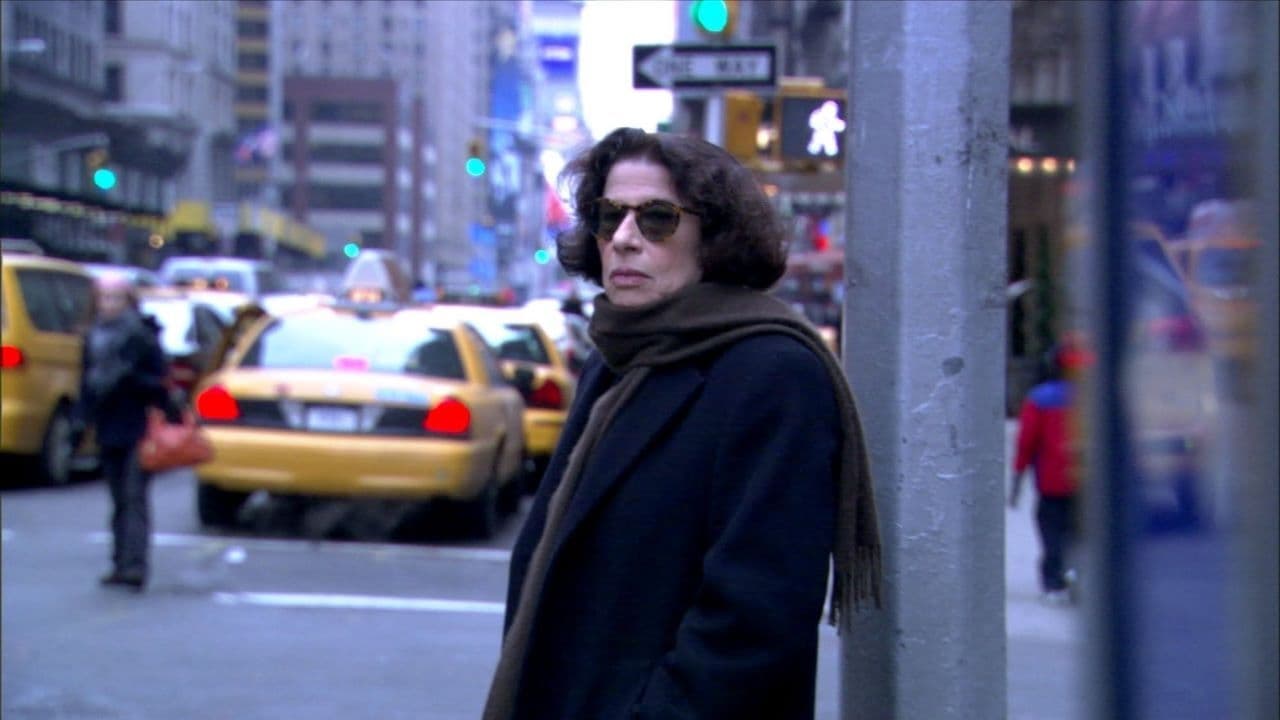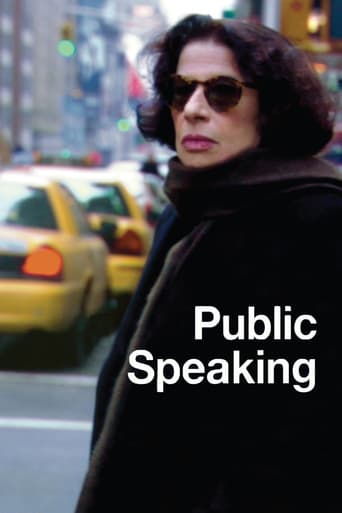Matcollis
This Movie Can Only Be Described With One Word.
Salubfoto
It's an amazing and heartbreaking story.
Edwin
The storyline feels a little thin and moth-eaten in parts but this sequel is plenty of fun.
Staci Frederick
Blistering performances.
jzappa
With the arguable exception of the final shot of Gangs of New York, this cinematic portrait is the closest Scorsese has come to the modern New York, the New York he has seemed to leave behind in his work. He even uses references to his own classic NYC films. There is more than one moment in which Scorsese gently recreates Travis' smoke-filled night driving along apparently red light-style districts, immortalizing the subject of this documentary's pearl grey checker cab, complete with Bernard Herrmann's score, as she is herself a relic of Old NYC, much like Travis. When you're the director of Taxi Driver and you find out your focus of study is a New Yorker who drives an old checker cab, you can't help but be self-referential to portray the contrast between the New York before it became a tourist attraction and the New York of today.Unlike Travis, however, Scorsese finds this protagonist hilarious. And rightly so, because she is. Public Speaking centers on the antiquated calling of star intellectual Fran Lebowitz. What materializes, then again, is certainly a study of Lebowitz but also by expansion one of a city, and a scholarly culture, that has been severely thinned over the last thirty some years, apparently not for better. The grimy, vigorous, violent city that worked as Scorsese's inspiration is now dead, Lebowitz proposes, maybe accounting for why Scorsese finds little stimulation there of late. What lingers, as per this film's cantankerous figure of interest, is a realm of high-priced real estate and ridiculous smoking bans. Known more for her lecturing appearances than her slight literary productivity, Lebowitz is the ultimate chatterer, which makes her the ultimate interviewee.Shot chiefly from Lebowitz's favorite table at The Waverly Inn, Public Speaking is like a stand-up film starring a comic who keeps a safe distance from the stand-up characterization. This café, which is one of New York's bona fide old boys' clubs, is a steady prompt that Lebowitz has one foot in yesteryear and another resolutely in the here and now. Scorsese provides Lebowitz abundant occasion to both sardonically criticize the changes in contemporary politics and wax melancholy about the New York of her early life. Absorbing her discourse, one cultivates a true admiration for the talent of her speechifying. Each acerbic jab that she chucks is especially mirthful owing to the foul reality it accommodates. Lebowitz may be rather wedged in days gone by, but she remains there of her own volition, patently asserting that it's preferable to today's cultural wasteland.What makes Public Speaking most idiosyncratic in Scorsese's body of work is that little seems hallowed in this film, which makes it a bracing aide memoire of a media culture that some time ago was energized by provocative wit and intellect. Lebowitz's stance on religion, the toll of AIDS, gentrification and celebrity are each relatively scandalous in this current atmosphere of cut-and-dried idea sanitization, but the sense behind assertions like these is difficult to wave. Lebowitz at this stage has little concern with charming new fans, so sure is she of the pitiful shape of her audience. The surprise she pretends whenever a young person makes a perceptive remark says a lot. Scorsese, for his part, does little to water down or even interpret what she has to say, in spite of one's patience for a personality that's so plainly immutable. Knowing the director's roster of religiously imbued, guilt-ridden characters, one wonders how shocking Lebowitz's views are to him. Regardless of whether or not he felt that way, one also sees in that repertoire of protagonists a nonjudgmental, deferential teller of their stories. In this way, Public Speaking, for better or worse, does its subject justice and finds little else necessary.
MisterWhiplash
The main character of Public Speaking, the latest Martin Scorsese documentary/profile, is conversation. Only he is a little too fidgity visually (and why not, he's friggin Scorsese after all) to stay in one spot on a subject like Louis Malle could do with Gregory and Shawn with 'Andre'. Indeed Scorsese, while obviously being the one spoken to along with another person, by humorist/author Fran Lebowitz, she lets her mind and mouth, moving and thinking always as she speaks very fast but eloquently, let's that be the driving force of the film. He'll occasionally cut to a scene or something to demonstrate what she might be talking about, or something surprising like an old commercial from the 1950's or (gasp) footage from his own Taxi Driver to show what the streets of NYC in the 70's were like. Lebowitz is the figure of the film, and if you can find her interesting and funny then you're good to go already. The crowd I saw the film with at a limited engagement in NYC was perfect to see it with: not too large, but totally in tune with her way of wit. Her attitude should be presumptuous and pompous - she's one of those who says "I'm right about everything!" - but she's right about enough stuff, and funny about it, that it's alright. She goes through a lot of topics, mostly about herself and how she came to be from a woodsy NJ background to one of Andy Warhol's not-quite pop-stars ("It was a joke!" she says of his whole concept of superstardom), how she gained some fame as a writer, and then slacked off for many years, and of course Feminism, politics, etc. I was surprised how taken I was with her way of thinking and speaking, as I had never heard of her before watching the film. Scorsese moves things along at a fast pace but never where it's too fast, and we get to know this person by the end of a sorta dinner-conversation (though there's no food and no drink outside of water). The editing style, though mostly rather standard for the director (mostly cutting shots of close-ups and mediums of Lebowitz), is most on fire when he cuts to the clips, such as one between two older men on a 1968 TV show where the discourse becomes nasty very quick. What drew me in ultimately though, as much as it was Lebowitz being a charming (almost in spite of herself) figure, was how intelligence just radiates in the film and a quest for knowledge that is pertinent. You want to know about her, from her, whatever it is, and that's fascinating. It's a conventional expose of an unconventional woman - that is, unconventional from today's standards of stupidity, ignorance, and corporate defeat. She's someone you might want to have a coffee with, if she could tolerate *you* first, or ultimately visa-versa.
Greg Debniak
I have been reading, here and there, quotes from Fran Lebowitz for decades, not really knowing who she was.She is a virtuoso at cutting through the haze and nonsense of American culture to expose the ludicrous truths beneath. I've always felt sort of silly, being American, and now I know why. Thank you, Fran, for putting into words what any well-traveled American already knows in their heart but can't quite verbalize.We need people like Fran to give us an honest look at ourselves and knock some of the pompous self-righteousness out of us now and then. Thank you, Fran and Mr. Scorsese.
adrienne_aline
Fran Leboits is an uncommon woman. The film is basically one long, casual interview.She's a fast-talking, witty, very opinionated, intriguing story-teller. Her humor reminds me of a less crass, less cynical version of George Carlin. She talks about being a woman, the biological inequality of women (which I rarely get to hear anywhere), homosexuality, the military, marriage, her cigarette addiction, "elites", American culture, democracy, a little bit of everything. Instead of ramming her Jewish background down your throat, she makes humorous, poignant observations. Definitely check it out, especially if you live in or around NYC.

